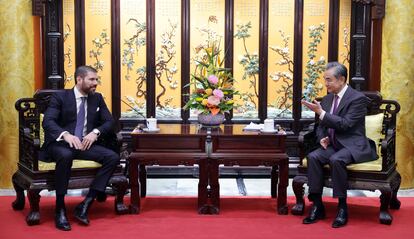An ‘all-expenses-paid trip to China’ and a trade agreement: Daniel Ortega’s new international strategy
Nicaragua is preparing to sign a new deal with its Asian partner after breaking ties with Taiwan in December 2021


“Do you want to win computers, cellphones and smartwatches? Or even an all-expenses-paid trip to China?” That’s what the propaganda machine of the Nicaraguan government is asking people on social media, where a trip to China is up for grabs. Anyone interested must “send a video of less than three minutes long talking about the friendship between China and Nicaragua.” The call has not triggered much of a response, since Nicaragua has little connection with China, either culturally or commercially. But the Sandinista government of President Daniel Ortega, and his wife, Vice President Rosario Murillo, have been going to lengths to promote Nicaragua’s relationship with Beijing. The trip to China is set to be raffled off days before China and Nicaragua formalize a free trade agreement (FTA). Little, however, is known about the fine print.
Nicaragua and China restored diplomatic relations in December 2021, when the former cut ties with Taiwan, the self-ruled island which China regards as its own. Following the move, the two countries signed a memorandum of understanding (MoU), which is considered the preliminary step to the signing of an FTA. Trade between both countries — which are separated by more than 8,700 miles — reached $760 million in 2022.
But most of that trade benefits China. In the first half of 2023, Nicaragua’s exports to China were just $6.7 million — a tiny figure compared to Nicaragua’s relationship with its main trading partner: the United States. By way of comparison, in that same time period, Nicaragua’s exports to the United States reached almost $1 billion. The FTA with China is viewed with great skepticism by both Nicaraguan and international analysts. Critics believe that it will not significantly boost the Nicaraguan economy and, instead, further strain relations with the United States.
¿Querés ganar computadoras, celulares y relojes inteligentes? ¿O incluso un viaje pagado a China?
— El 19 Digital (@el19digital) August 8, 2023
Mándanos una propuesta de vlog con la temática "Amistad entre China y Nicaragua" y ya estás participando por estos grandes premios.
👇👇👇
embajadaprc@gmail.com#Nicaragua pic.twitter.com/5uLHAgwXGI
The FTA with China comes as the Sandinista government strengthens diplomatic relations with dictatorships and authoritarian regimes, such as North Korea, Iran and Syria. Faced with international isolation, Ortega and Murillo are seeking to legitimize themselves with these alliances that challenge Washington, say critics. Analysts argue that this foreign policy has practically zero financial and trade benefit for Nicaragua.
But the Chinese Ministry of Commerce has defended the FTA with Nicaragua. It said that the deal will “provide an institutional guarantee for bilateral economic and trade exchanges” and “help elevate bilateral economic and trade cooperation.” Beijing estimates that Nicaragua’s gross domestic product (GDP) — forecast at between 3.4% and 3.5% for the 2023-2026 period — could rise by at least two additional points.
Little is known of the details of the deal. In principle, Nicaragua will be able to export products duty free to China in several categories, such as meat, seafood, bovine offal, vegetables, red beans, rum, textiles, peanuts and automotive harnesses.
China will be able to export to Nicaragua tariff-free products such as insecticides, fungicides, herbicides, plastics and raw materials for textiles and toys. The list of 78 Chinese products is divided into more than 20 groups that include live plants, fresh or chilled vegetables, prepared and preserved fish, confectionery, malt extract, pasta, cereals, biscuits, mushrooms, sauces, seasonings, and much more.
Margaret Myers, director of the Asia & Latin America Program at the Inter-American Dialogue, participated last week in a forum in Costa Rica called China in Latin America: Reality and Trends in Costa Rica and Central America, promoted by the think tank Expediente Abierto and the Friedrich Naumann Foundation. At the forum, the expert stressed that the size of the Central American market is too small to be of commercial interest to China. “Beijing is interested in the region for the geopolitical reason of advancing in an area of direct influence of the United States, China’s true competitor in the world,” she said.
Even an ally of the Nicaraguan government is skeptical of the deal with China: Dante Mossi, the president of the Central American Bank for Economic Integration (CABEI), said that the Central American countries have not obtained any significant trade gains from their relationship with China after breaking ties with Taiwan.
China sells more than it buys
Felix Maradiaga, an exiled political prisoner and former investment adviser for a private firm in China, pointed to trade between China and Costa Rica as an example. “San José only places 2.5% of its exports in that market, which last year totaled $17.9 billion. However, China supplies 13.2% of its imports, which last year totaled $24.7 billion,” said Maradiaga, who was a former presidential candidate in Nicaragua.
“That is significant,” continued Maradiaga, “because Costa Rica is a larger producer of goods and services than Nicaragua and has a stronger economy. How much will Ortega be able to sell to China compared to Costa Rica? I do not think it will exceed $300 million in sales. Meanwhile, trade between the United States and Nicaragua reached a record of $8.3 billion in 2022. So I don’t think that Beijing will replace Washington in that equation.”
Experts agree that Nicaragua will be a “cheap trade” partner for China, which also wants to reduce international recognition of Taiwan and ensure Nicaragua’s vote in international forums such as the United Nations.
Hernán Alberro, an independent researcher and administrator of the China Index platform, added that FTAs with China “are not free trade agreements, but trade restrictions on products that China will not allow to enter its territory.”
“These are agreements that are generally more favorable to Beijing, which sells cheap, low-quality products that it cannot sell to Europe or the United States due to quality controls in those markets,” Alberro explained. “In Latin America and African countries, the FTAs with China generate a contrary flow of trade, it is more about what China sells than what it buys.”
Despite these concerns, the Ortega-Murillo regime is working to promote the relationship, with the all-expenses-paid trip to China dominating government publicity. According to former opposition lawmaker Eliseo Núñez, this is an attempt to convince Nicaraguans that they have gained a sense of “closeness” with China. “It is manipulative,” he explained. “They want to say that the United States does not raffle trips, but China does. However, Nicaragua’s dealings with China do not solve the country’s economic problem. They are infinitely smaller transactions compared to those with the United States” said Núñez, who is exiled in Costa Rica.
Sign up for our weekly newsletter to get more English-language news coverage from EL PAÍS USA Edition
Tu suscripción se está usando en otro dispositivo
¿Quieres añadir otro usuario a tu suscripción?
Si continúas leyendo en este dispositivo, no se podrá leer en el otro.
FlechaTu suscripción se está usando en otro dispositivo y solo puedes acceder a EL PAÍS desde un dispositivo a la vez.
Si quieres compartir tu cuenta, cambia tu suscripción a la modalidad Premium, así podrás añadir otro usuario. Cada uno accederá con su propia cuenta de email, lo que os permitirá personalizar vuestra experiencia en EL PAÍS.
¿Tienes una suscripción de empresa? Accede aquí para contratar más cuentas.
En el caso de no saber quién está usando tu cuenta, te recomendamos cambiar tu contraseña aquí.
Si decides continuar compartiendo tu cuenta, este mensaje se mostrará en tu dispositivo y en el de la otra persona que está usando tu cuenta de forma indefinida, afectando a tu experiencia de lectura. Puedes consultar aquí los términos y condiciones de la suscripción digital.








































